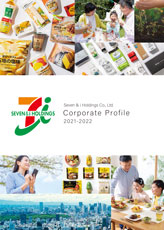- Top
- Sustainability
- Seven & i Holdings Material Issues
- Material Issues 7
- Building a Sustainable Supply Chain Together with our Business Partners
- Sustainability
- Message from the Representative Director & Executive Chair (Kaicho)
- Basic Policies of Sustainability Initiatives
- Sustainability Management
- Stakeholder Engagement
- Business Partners
- Seven & i Holdings Material Issues
- Corporate Governance
- Compliance
- Information Security and Personal Information Protection
- Human Rights Initiatives
- Human Capital Initiatives
- Climate and Nature-related Information Disclosures —Responses to TCFD/TNFD Recommendations
- Social Contribution Activities
- Business Continuity Initiatives
- Overseas Initiatives
- Sustainability Data Book
- External Recognition and Awards
- SASB/GRI Index
- Index for Researchers
- Keyword search
- Editorial Policy
- Social
- Environment
Building a Sustainable Supply Chain Together with our Business Partners
Since its establishment, Seven & i Holdings Co., Ltd. and its consolidated subsidiaries (hereinafter referred to as "our Group") have always been committed to being a sincere company that is trusted by the various stakeholders who support our corporate activities, including customers, business partners, shareholders, local communities, and employees, as stated in our corporate creed.
Today, the world is facing a variety of issues related to human rights. Companies are being required to fulfill their social responsibilities, such as respecting and protecting human rights throughout the supply chain of the products and services they handle, complying with laws and regulations, protecting the environment, and giving consideration to working conditions. Our Group places the highest priority on respecting and protecting human rights, and we ask our business partners to understand and implement the Seven & i Holdings Business Partner Sustainable Action Guidelines. We believe that we can provide safe and secure products to our customers by working together with our suppliers to implement the Seven & i Holdings Business Partner Sustainable Action Guidelines and build a supply chain that fosters sustainable development.
Strengthening Enactment of the Seven & i Holdings Business Partner Sustainable Action Guidelines
Seven & i Holdings is strengthening the enactment of the Business Partner Sustainable Action Guidelines in order to provide safe and reliable products to customers and to fulfill our social responsibilities in areas such as human rights, labor, and the environment in cooperation with our suppliers. We also ask our suppliers to conduct and promote human rights due diligence.
Thorough Implementation of the Seven & i Holdings Business Partner Sustainable Action Guidelines
In April 2017, Seven & i Holdings revised the "Seven & i Group Business Partner Action Guidelines" formulated in 2007 as the "Seven & i Holdings Business Partner Action Guidelines," and we have asked our business partners to understand and comply with these guidelines. In December 2019, we further revised these guidelines as the "Seven & i Holdings Business Partner Sustainable Action Guidelines" (hereinafter, the Guidelines). Further revisions were made in March 2025 in light of various environmental changes. The purpose of the Guidelines is not only to ensure the safety and quality of products and services handled by our Group, but also to fulfill our social responsibilities together with our suppliers by promoting the protection and respect of human rights, compliance with laws and regulations, global environmental conservation, and consideration for the working environment throughout the supply chain. These guidelines are disseminated to all Group companies through various meetings with suppliers.
Seven & i Holdings Business Partner Sustainable Action Guidelines (Excerpt)
- Compliance with Laws and Respect for International Norms
- Respect for Human Rights
- No Child Labor and Protection for Young Workers
- No Forced Labor
- Employment and Protection of Workers
- Payment of Living Wages
- Prohibition of Abuse, Harassment, Discrimination and Inhumane Treatment
- Occupational Health and Safety
- Preservation of Global Environment
- Prevention of Confidential Information Leakage and Information Management
- Management of Personal Information
- Quality Control and Ethical Response
- Relationship with Local and International Communities
- Anti-corruption and Fair Business Practices
- Protection of Intellectual Property
- Export and Import Management
- Development of Whistle-blowing Systems
- Disaster Preparedness
- Development into Supply Chain
- Monitoring
The Seven & i Holdings Business Partner Sustainable Action Guidelines can be found here.
*As of September 2025, available in 21 languages.
Establishment of a Human Rights Due Diligence System
Our Group's management philosophy is to be a sincere company that is trusted by various stakeholders, as stated in its corporate creed. In particular, we recognize that "respect for human rights" is the most important factor in conducting sustainable business activities and remaining a trustworthy and honest company.
In October 2021, our Group established the Seven & i Holdings Human Rights Policy to understand the human rights of all stakeholders, including customers, business partners, shareholders, local communities, and employees, and to fulfill our responsibility to respect human rights.
In order to respect and protect human rights in the supply chain, the Seven & i Holdings Business Partner Sustainable Action Guidelines express the Group's stance on respect for human rights and request that suppliers comply with the guidelines.
The Seven & i Holdings Business Partner Sustainable Action Guidelines have been formulated as action guidelines that focus on respect for human rights in accordance with international labor standards such as the United Nations Guiding Principles on Business and Human Rights, the ILO Basic Labour Conventions, and the OECD Guidelines for Multinational Enterprises. We are working to strengthen our human rights due diligence system by implementing a human rights due diligence process that includes the identification and assessment of human rights risks, the implementation of actions to mitigate human rights risks, the monitoring of corrective actions, and the disclosure of information, as well as developing a grievance mechanism and promoting dialogue with stakeholders.
Human Rights Due Diligence Diagram
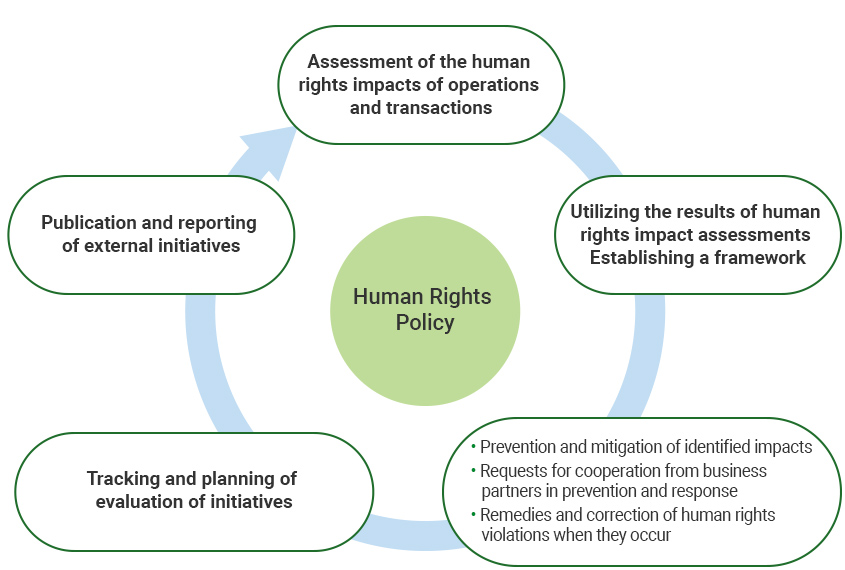
Human Rights Due Diligence System for the Business Partner Sustainable Action Guidelines
Our Group assesses the potential negative human rights impacts of its business activities on the supply chain, and based on the results of the assessment, prevents and mitigates the identified negative human rights impacts, requests cooperation from suppliers in preventing and addressing such impacts, and takes remedial and corrective actions in the event of human rights violations. We have an ongoing process of conducting follow-up evaluations and disclosing the results on our website.
Assess, Identify, and Analyze negative impacts on Human Rights:
Grasping the production factories of private-brand products, conducting self-checks by suppliers, and conducting CSR audits by a third-party auditing organization
Actions:
Education and awareness-raising activities aimed at reducing human rights risks, memorandum on CSR with suppliers commissioned to manufacture private-brand products, start of business transactions based on the premise of obtaining CSR audit certification at private-brand product manufacturing factories in China and Southeast Asia
Follow-up Evaluation:
Issue remediation and corrective action support
Information Disclosure:
Report the results to the Board of Directors and publish the results on the web
Relief Measures:
Establishment and operation of a dedicated supplier helpline as a grievance mechanism
Human Rights Due Diligence System for the Business Partner Sustainable Action Guidelines
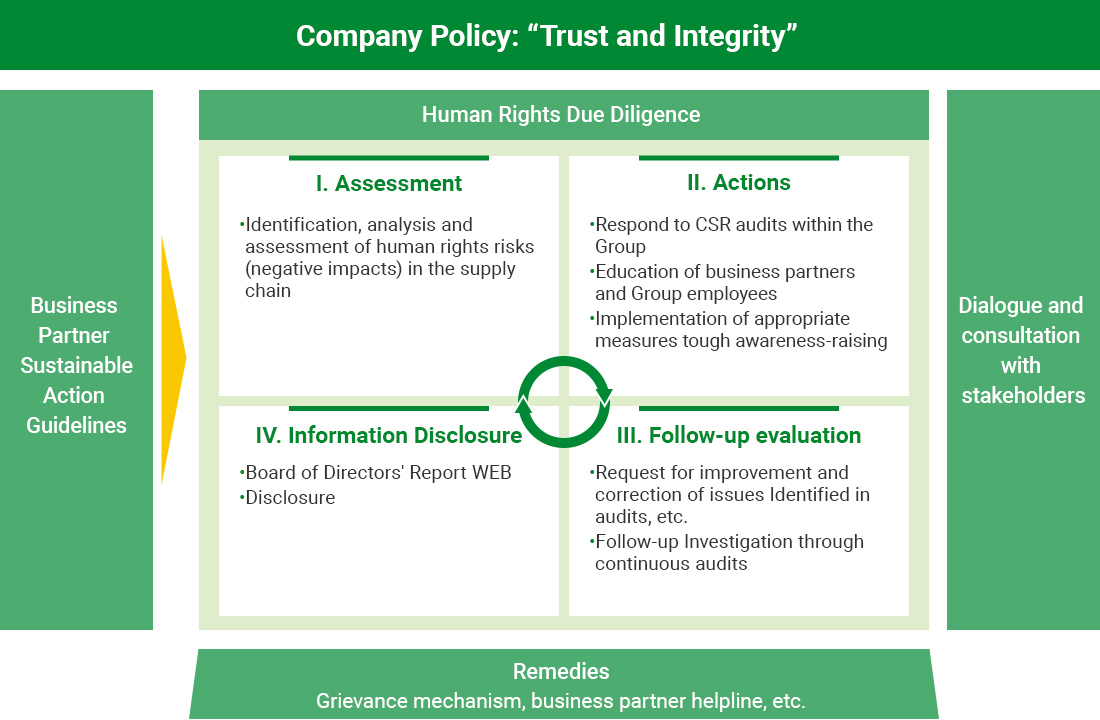
Our Group classifies supplier risks into five levels (R1 to R5) by region from the perspectives of human rights, labor environment, and global environmental conservation, and designates the region with the highest risk as R1, with "emerging regions in China and Southeast Asia" as R1 for priority response.
Operation of a Dedicated Helpline for Business Partners as a Grievance Mechanism
Seven & i Holdings has established the Seven & i Holdings Business Partner Helpline at a third-party organization as a consultation and reporting contact for early detection and prevention of problems in order for us and the Group companies to continue to be an honest company trusted by society. We are striving to further ensure fair trade by receiving consultations and reports from suppliers, regarding violations of laws and regulations, social norms, contracts, and internal rules including the "Seven & i Holdings Corporate Action Guidelines" concerning officers and employees of us and the Group companies, and serious violations of the "Seven & i Holdings Business Partner Sustainable Action Guidelines" concerning suppliers, including those in the supply chain of us and the Group companies, and human rights violations, etc., as stipulated in the Seven & i Holdings Human Rights Policy.
|
*Reports related to internal matters of business partners, 7-Eleven franchisees, and employees of Seven & i Holdings and its subsidiaries are generally excluded from the scope of this service. Please note that we may not be able to respond to inquiries from those not eligible to use the service. |
[Contact Information]
・Consultation and Report within Japan (Domestic Reporting)
(1)Contact: IntegreX Inc.
(2)WEB: http://ws.formzu.net/fgen/S53103280 (in Japanese)
E-mail : 7andi-helpline@integrex.jp
Mailing address: 7F, 5-8-14 Hiroo, Shibuya-ku, Tokyo 150-0012, Japan (IntegreX Inc.)
・Consultation and Report from oversea (Oversea Reporting)
(1)Contact: Dedicated website of TSUHO Support Center Co., Ltd. (Global Stakeholders Hotline)
(2)WEB: https://7andi-helpline.kaigaitorihiki.com(Company code: 7andihelpline)
Languages supported: English, Thai, Portuguese, Japanese
*We do not accept reports from China, the U.S., Russia, or North Korea.
*We have adopted a method in which there are no fields for entering personal information such as e-mail addresses or names. Please note that there is no mutual communication between us and information providers.
Operation of the Seven & i Holdings Business Partner Sustainable Action Guidelines
Our group has asked factories that manufacture our private-brand products (Seven Premium) and private-brand products of the Group companies to cooperate in CSR audits if they are located in areas of high risk for human rights protection and legal compliance. In addition, our Group has been conducting CSR audits of factories that manufacture private-brand products in general. We also share the status of promotion of the Seven & i Holdings Business Partner Sustainable Action Guidelines with our suppliers and support corrective measures for problems.
We ask potential suppliers to understand and comply with the Guidelines before starting business with us. If the supplier is found to be in compliance based on the results of the CSR audit and the status of corrective measures, a "Certificate of Conformity" is issued. The acquisition of a Certificate of Conformity is a prerequisite for continuing business with us.
Flow of CSR Audit and Certification System for PB Manufacturing Factories in China and Southeast Asia

Agree to the Memorandum on CSR
Our Group, together with its suppliers, aims to realize the goals of Goal 8 of the SDGs, which are "human-oriented employment with job satisfaction," "eradication of forced labor," and "prohibition and elimination of child labor. In addition, we will actively work to maintain and improve the appropriate working environment of our suppliers, such as by "ensuring appropriate labor practices in the supply chain. We ask our suppliers to agree to a memorandum on CSR as a condition of starting/continuing business with us when we outsource the manufacturing of our private brands.
In order to fulfill our responsibility to respect corporate social responsibility (CSR) and human rights, and to contribute to the realization of a sustainable society, we confirm that we will comply with the Corporate Action Guidelines and that we will continue to work together to promote CSR and human rights considerations throughout the supply chain. The purpose of this report is to confirm that we will continue to work together to promote CSR and respect human rights throughout the supply chain in light of the demands of society.
Memorandum on CSR
- Article 1 (Purpose)
- Article 2 (Compliance with the Seven & i Holdings Business Partner Sustainable Action Guidelines)
- Article 3 (Implementation of Internal Control over the Business Partner Sustainable Action Guidelines)
- Article 4 (Explanation of the Business Partner Sustainable Action Guidelines, etc.)
- Article 5 (Obligation to Report the Status of Compliance with the Business Partner Sustainable Action Guidelines, etc.)
- Article 6 (Duty to report)
- Article 7 (Right of A to investigate and audit)
- Article 8 (Demand for correction in case of violation)
- Article 9 (Right of cancellation in case of non-compliance with demand for correction)
- Article 10 (Indemnification for damages)
- Article 11 (Revision of the Business Partner Sustainable Action Guidelines)
- Article 12 (Effective Period)
- Article 13 (Governing Law and Jurisdiction)
- Article 14 (Matters to be discussed)
*This document has been prepared with reference to the materials of the Japan Federation of Bar Associations.
Conducting Self-Checks
Our Group provides a self-check sheet to allow suppliers to check the status of their promotion of the Business Partner Sustainable Action Guidelines and to support corrective actions as necessary. This checklist was created with reference to ISO 26000, the Keidanren Charter of Corporate Behavior, the OECD Guidelines for Multinational Enterprises, and the ILO International Labour Standards. Since November 2018, we have been checking similar content (124 items) as the CSR audits, including human rights and labor environment, global environmental preservation, and information management, for private brand product manufacturing contractors of our Group companies. In the fiscal year ended February 28, 2025, self-checks were collected from 1,035 factories to confirm their management status.
Items on the Self-Check Sheet (Excerpt)
- Legal Compliance
- Respect for Human Rights and Dignity
- Human Resources and Workplace Environment
- Preservation of Global Environment
- Relationship with Local and International Communities
- Information Management
- Product Safety Assurance
- Fair Business Practices
- Monitoring
Status of Self-Check Responses
|
FY |
No. of Factories Targeted |
No. of Factories who Replied (No. of Domestic/ Overseas Factories) |
Response Rate |
|
2024 |
1,218 factories |
1,035 factories (838/197) |
85.0% |
|
2023 |
1,210 factories |
1,151 factories (825/326) |
95.1% |
|
2022 |
1,386 factories |
1,287 factories (869/418) |
92.9% |
|
2021 |
1,593 factories |
1,303 factories (894/409) |
81.7% |
|
2020 |
1,546 factories |
1,267 factories (854 /413) |
81.9% |
Seven & i Holdings CSR Audit
In order to ensure the safety and security of products and to realize a sustainable society together with our suppliers, our Group has conducted third-party audits to the manufacturing factories of our suppliers in accordance with our own audit items (16 major categories and 117 check items). The audit items comply with international conventions such as the International Labour Organization (ILO) Convention, which is a global standard, and ISO 26000, and consist of the Seven & i Holdings Business Partner Sustainable Action Guidelines, protection of human rights, compliance with laws and regulations, occupational health and safety, and environmental protection.
16 Major Categories and 117 Items in the CSR Audit (Excerpt)
1. Implementation of Management System and Rules
- Organizations must implement and maintain a system in compliance with all items of the Seven & i Holdings Business Partner Sustainable Action Guidelines
- To the extent feasible, organizations should extend the Guidelines to their own supply chains.
- Organizations must monitor and comply with relevant laws and regulations, as well as international treaties and so forth.
2. Forced Labor
- There must be no forced, bonded or coerced prison labor.
- Employers must not force workers to make a financial deposit or submit their identification documents, such as a passport, and freedom of movement must be assured.
- Workers may resign freely as they wish, after giving adequate notice.
- National and regional laws pertaining to forced labor are recognized.
3. Freedom of Association
- Workers have the right to establish or join labor unions of their own choosing without being subject to discrimination, and hold the right to collective bargaining.
- Local laws and workers’ rights concerning freedom of association are recognized.
4. Health and Safety
- Safety protection measures must be applied to equipment and machinery and preventive maintenance must be undertaken.
- Chemicals must be handled and stored appropriately.
- All necessary protective equipment must be purchased and regularly replaced.
5. Child Labor and Young Underage Workers
- Children must not be put to work.
- Young workers under the age of 18 must not be made to work at night, or in a hazardous environment. This work includes tasks using chemical substances, work near such substances, or work where there is hazardous machinery or excessive noise. Heavy labor, night shifts, and work for long hours are also included.
6. Living Wages
- Wages must be paid at or above the national/regional legal standards, and also be paid at or above the living wage that enables employees to maintain an appropriate standard of living. The living wage includes welfare benefits (such as subsidies for lunch expenses and dormitory fees).
- Overtime allowances must be paid at the required statutory ratio.
- All allowances and benefits must be provided to workers as required by law.
- Documents detailing the labor conditions of workers, such as wage slips, information of labor recruiters, and contracts must be disclosed to workers. *The living wage includes food, housing cost, clothing, and other additional expenses related to health, transportation, personal care, child care, and education.
-
*The base of the living wage calculation is based on the anchor calculation method of the Global Living Wage Coalition.
7. Working Time
- Workers must not be habitually required to work over 48 hours per week. On average, workers must be given a rest period of one day every 7 days. Overtime must be voluntary and must not exceed 12 hours per week. Overtime must not be habitually requested and additional fees must always be paid.
8. Discrimination
- Discrimination in the course of recruitment, remuneration, provision of training, pay raises, dismissal and retirement is prohibited with respect to race, class, nationality, religion, age, disability, gender, marital status, sexual orientation, union membership, or political party affiliation.
9. Regular Employment
- To the extent possible, operations must be executed on the basis of generally accepted employment relationships based on national laws and regulations.
- Recruitment fees for workers to get a job must be borne by employers, not by the workers ("Employer Pays Principle") unless allowed by local labor law.
.10. Subcontracting Agreements, Domestic Industry, Outsourced Processing
- Subcontracting is not permitted without the prior consent of customers.
11. Disciplinary Action
- Physical abuse or punishment, threats of physical abuse, sexual or other forms of harassment, or verbal abuse or threats, must be prohibited.
- Disciplinary methods must be fair and effective and must not be arbitrary.
- Employers must show respect for the mental, emotional and physical health of workers in connection with the necessary disciplinary action.
12. Environment
- Organizations must pursue continuous improvement in their environmental performance and, at the very least, comply with local requirements and international laws and regulations.
- Chemical substances prohibited by international treaties, or laws and regulations, must not be used.
13. Fair Business Practices
- Laws and regulations related to fair business practices must be understood and complied with.
14. Ensuring Product Safety
- Products delivered to each our operating company must comply with the quality standards requested by each relevant operating company and comply with relevant legal standards established in Japan.
15. Security Management
- Security systems must be in place to ensure protection from access with malicious intent.
16. Interests of Local Communities
- Relationships with anti-social forces must be rejected.
Evaluation and Certification of CSR audits
The 16 major categories of the CSR audit are divided into three evaluation categories. The four most important categories are "forced labor," "child labor and young workers," "living wage (minimum wage)," and "disciplinary punishment. If any of these non-conformities is found, it will be classified as [Critical Non-conformity 1], and a recommendation will be made to the Group's operating companies that have contracts with the factory in question to discontinue business.
The next most important audit categories are categories of laws and regulations related to "health and safety," "working hours," "subcontracting," "environment," and "product safety." If a non-conformity is found, it is classified as a "Critical Non-conformity 2," and we notify the Group companies that have contracts with the factory in question to consider whether or not to continue doing business with them. If we decide to continue our business, we will conduct a follow-up audit to confirm that the problem has been corrected before continuing our business.
16 Audit Categories and Evaluation Categories (C1, C2)
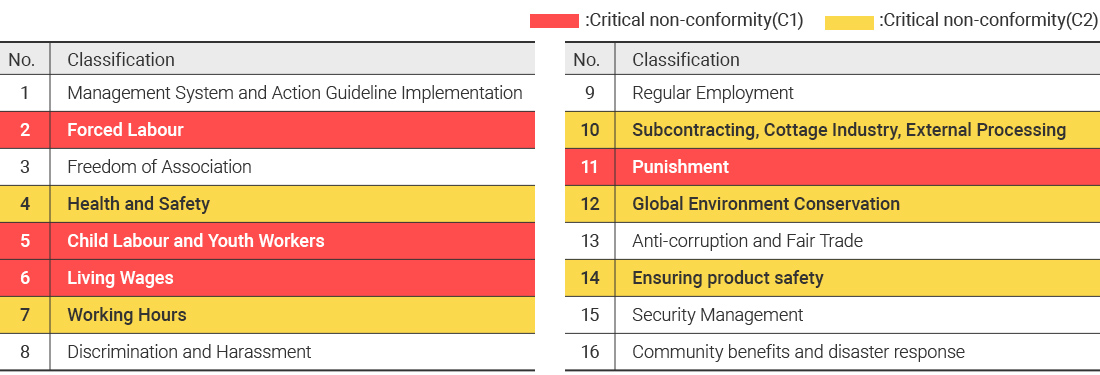
Evaluation Standard
CSR audit results are evaluated on a five-point scale of A, B, C, D, and E.
The "A" rating indicates that the CSR audit did not reveal any non-conformity with laws, regulations, or local ordinances, nor did it reveal any non-conformity with the Seven & i Holdings Business Partner Sustainable Action Guidelines.
"B" is for factories where no legal non-conformity was found but non-conformity to the Seven & i Holdings Business Partner Sustainable Action Guidelines was found, and "C" is for factories where no serious non-conformity was found but legal non-conformity was found.
"D" is the evaluation of a factory that has been confirmed to have Major Non-conformity Critical 2 or that has been confirmed to have 10 or more non-conformities with laws and regulations.
"E" is the rating for the most serious situation, where at least one [Critical 1 Major Non-conformity] corresponding to [Forced Labor], [Child Labor], [Living Wage (Minimum Wage)], or [Punishment] is identified, or where 10 or more [Critical 2 Major Non-conformities] or 20 or more non-conformities with laws and regulations are identified. All non-conformities are corrected within 90 days from the audit date, and if correction is confirmed, certification is given in accordance with the evaluation.
Certification Operational Rules (in China and Southeast Asia)
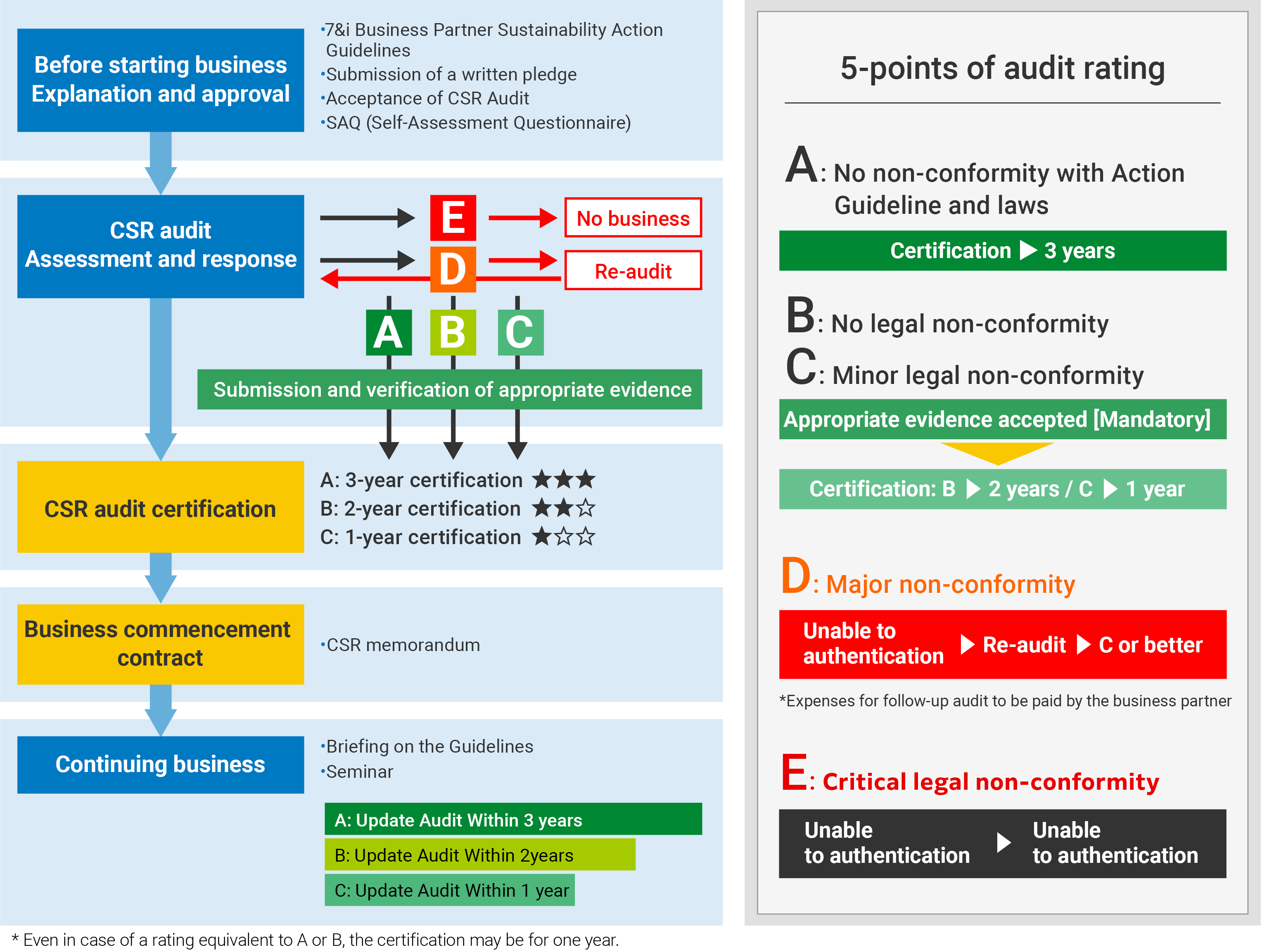
Audit Evaluation Standard
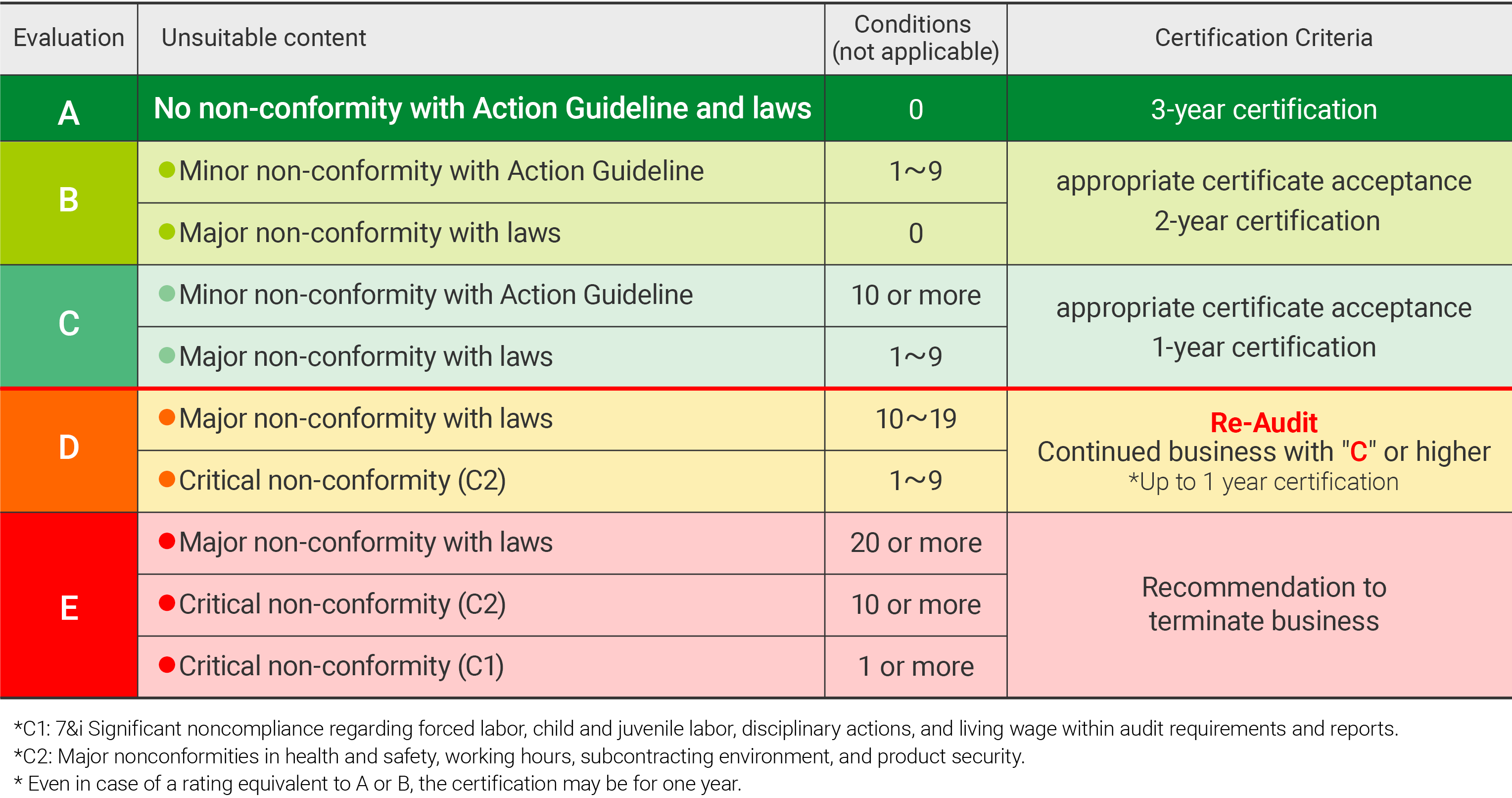
Flow of the Day of the CSR Audit
Seven & i Holdings provides advance notice and visits the factories to be audited to confirm compliance with the CSR audit items by checking sites, documents (e.g., pay slips), and data, and by interviewing managers and workers. Interviews with workers are conducted in a separate room, with only the auditors present, to prevent any instructions or retaliation from the employers. In principle, on-site audits are conducted in one day, from 9:00 a.m. to 6:00 p.m. Materials and images submitted by the factory during the audit will be properly managed and supplemented based on the confidentiality agreement, and will not be leaked to outside parties.
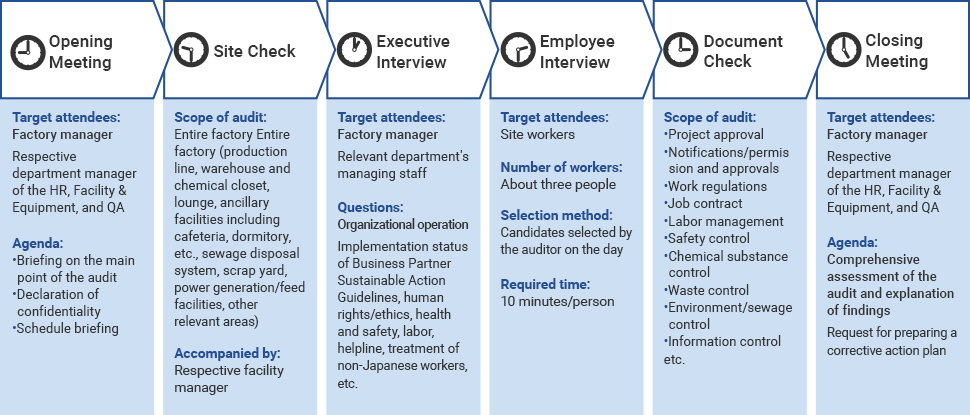
Confirmation of Correction after Audit
If any non-conformity is found as a result of the audit, the third-party audit organization will point out the non-conformity to the supplier. Suppliers are requested to submit a Corrective Action Plan (CAP) based on the findings to the audit organization within 10 business days after the audit, and are required to take immediate action to improve the issues identified. After receiving a report from the supplier on the completion of improvement, we will confirm the completion of the improvement by receiving photos and collateral materials (evidence) showing the improvement. However, in cases where a certain standard is exceeded, such as when a large number of serious non-conforming items occur, we visit the factory again and conduct another audit to confirm that the problem has been corrected.
◆Process for submitting a Corrective Action Plan (CAP)
(1) Report on the cause of non-conformity and corrective action plan: Submit to the auditor within 10 days
(2) Implementation of corrective actions: Submit evidence to auditors within 90 days.*
(3) Appropriate CAP: Accepted by auditor → Confirmed and approved by Seven & i Holdings → Certificate issued
Inappropriate CAP: Return submitted documents and request for re-submission
*If evidence of correction is not submitted within 90 days of the completion of the audit, a re-audit (follow-up audit) will be conducted.
Response to Major Non-conformities
Seven & i Holdings does not tolerate any form of human rights violation in the Group's business or supply chain. Our response to the major non-conformities is stipulated in the "Seven & i Holdings Business Partner Sustainable Action Guidelines," which we disseminate to all our suppliers and explain at supplier briefings.
CSR Audit Certification System
Seven & i Holdings issues a Certificate of Conformity to suppliers when the results of CSR audits indicate conformity. If a nonconformity is found, a "Certificate of Conformity" is issued to the supplier when the non-conformity has been corrected or when the third-party auditing organization and Seven & i Holdings determine that the content of the plan described in the CAP is valid.
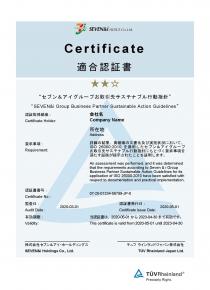
CSR audit certification "Certificate of Conformity"
Results of CSR Audits of Suppliers
CSR audits of Overseas Factories
Since fiscal 2012, Seven & i Holdings has been conducting annual CSR audits to confirm compliance with the Seven & i Holdings Business Partner Sustainable Action Guidelines by defining critical suppliers as those factories that are judged to be particularly important from the perspective of risk management. We conduct annual CSR audits to confirm compliance with the Seven & i Holdings Business Partner Sustainable Action Guidelines.
In order to ensure fairness, we outsource our audits to an external inspection organization, TÜV Rheinland Japan. Regular meetings are held with auditors every year to standardize the required items.
Our Definition of “Critical Suppliers”
Seven & i Holdings defines 1,218 factories as critical suppliers. They manufacture the Group's private brand products, Seven Premium, or private-brand products for Group companies in China and Southeast Asia (13 countries). They deal with high volume and we consider them critical for our products and non-substitutable. As of the end of February, 2025, approximately 260,000 people worked in the factories defined as critical suppliers, with a gender ratio of approximately 48% male and 52% female.
Number of CSR Audits (Overseas Factories)
| FY | 2012 | 2013 | 2014 | 2015 | 2016 | 2017 | 2018 |
2019 |
|
No. of audited factories |
17 | 28 | 328 | 226 | 245 | 215 |
274 |
304 |
|
Implementation rate*1 (%) |
100.0 | 100.0 | 100.0 | 100.0 | 100.0 | 100.0 |
100.0 |
100.0 |
| FY |
2020
|
2021
|
2022 |
2023 |
2024 |
2025 Plan |
|
No. of audited factories |
413 | 357 | 322 | 254 |
200 |
200 |
|
Implementation rate*1 (%) |
89.8*2 | 79.9*2 | 74.2*2 | 77.7 |
83.3 |
― |
*1 Ratio of the number of factories audited to the planned number of factories (excluding factories that no longer need to be audited due to completion of production, cessation of business)
*2 Suspended audits at some factories to prevent spread of new coronavirus
Number of Re-audited Factories (Overseas)
|
FY |
2020 |
2021 |
2022 |
2023 |
2024 |
|
|
Product Category |
Aparel | 24 | 17 | 17 | 3 | 1 |
| Household Goods | 9 | 12 | 3 | 4 | 3 | |
| Foods | 7 | 8 | 8 | 5 | 2 | |
| Total | 40 | 37 | 28 | 12 | 6 | |
*Introduce a certification system based on CSR audits as a condition for starting new transactions from FY2020
Response to Non-conformities (CSR Audit Major Non-Conformity Cases and Remedial, Corrective, and Preventive Actions for Non-Conformity)
In the fiscal year ended February 28, 2025, overseas CSR audits were conducted at 200 factories. Serious non-conformities, equivalent to C2 non-conformities, were identified at six factories and corrective actions were taken. Non-conformities related to occupational health and safety (management of chemicals/maintenance of facilities/failure to use personal protective equipment, etc.) and living wage (unpaid wages/inadequate employment contracts, etc.) were identified. We immediately took corrective actions on the matters indicated, including reviewing management methods and ensuring use of personal protective equipment and payment of unpaid wages. In the case of improper management of chemicals, for example, we confirmed the implementation of corrective actions, including the transfer of chemicals to separate controlled areas and implementation of proper management within those areas. In addition, corrective actions were confirmed for all major and minor non-conformities identified through CSR audits. As a result of the CSR audits, no non-conformities were found involving forced labor, child labor for those under 15 years of age, or disciplinary measures.
To prevent the occurrence of non-conformities, we conducted online compliance training for suppliers in the fiscal year ended February 28, 2025 on-demand. It explains examples of non-conformities that are likely to occur (e.g., human rights violations). A total of 4,700 people viewed the training. We will continue to promote ongoing efforts to respect human rights and improve the working environment.
CSR Audits of Domestic Factories
Since 2018, Seven & i Holdings has been conducting CSR audits of domestic factories contracted to manufacture its private brand, SEVEN PREMIUM, in order to appropriately address issues such as work style reform for domestic employees, employment of foreign workers, and global environmental conservation. Full-scale audits have been conducted at 535 factories in fiscal 2022, 527 factories in fiscal 2023, and 626 factories in fiscal 2024 (approximately 50% of the total). In the fiscal 2024 audits, some kind of non-compliance was identified at approximately 93% of factories, and corrective measures were confirmed to be taking place. Furthermore, no serious non-compliances related to child labor, forced labor, disciplinary action, discrimination against foreign workers, or forced labor were found in fiscal 2024.
Seven-Eleven Japan commissions third-party organizations to conduct CSR audits of some of its domestic suppliers, using the same standards as Seven & i Holdings' CSR audits. The initiative began in fiscal 2016, and audits were conducted at 58 factories in fiscal 2024. We will continue to promote CSR together with our business partners across the entire group.
Informing Suppliers of the Seven & i Holdings Sustainable Action Guidelines
Distribution and Delivery of the Seven & i Holdings Business Partner Sustainable Action Guidelines
From June to October 2018, Seven & i Holdings distributed the Seven & i Holdings Business Partner Action Guidelines to 18,484 companies with confirmed business relationships through the product development staff of each Group company. In December 2019, we revised the guidelines to the Seven & i Holdings Business Partner Sustainable Action Guidelines to emphasize human rights and adapt to changing social conditions, and by June 2020, we had distributed the guidelines to 12,385 companies.
In March 2025, we revised the Business Partner Sustainable Action Guidelines to address the latest human rights issues and global risks. The details of the revisions have been communicated at CSR audit briefings for suppliers.
In addition, from fiscal 2020, new suppliers who outsource the manufacture of private brand products in China and Southeast Asia will be required to submit a written pledge to comply with the guidelines, sign a memorandum on CSR, and undergo a CSR audit before commencing business. We communicate these guidelines to all suppliers, including those outside Japan, and confirm their level of understanding in an effort to ensure compliance with the guidelines.
Holding a Briefing Session on the Seven & i Holdings Business Partner Sustainable Action Guidelines
Seven & i Holdings holds local briefings on the Seven & i Holdings Business Partner Sustainable Action Guidelines and related policies for suppliers in China and Southeast Asia, where CSR risks are considered to be high, among those to whom we outsource the manufacture of private brand products.
At the briefing, a representative from the Sustainability Development Office of Seven & i Holdings provides explanations accompanied by a local language interpreter.
In the fiscal year ended February 28, 2021, with the global spread of COVID-19 infections, briefing sessions on the Seven & i Holdings Business Partner Sustainable Action Guidelines and CSR audits were suspended. Accordingly, starting in June 2020 for our business partners with production facilities overseas we used on-demand distribution to brief on the Guidelines and encourage their implementation. Since 2020, we have also made materials available in Chinese and five other Asian languages. Additionally, we distribute videos explaining our CSR audits, with Chinese narration, to business partners in China.
In the fiscal year ended February 28, 2025, we conducted live and on-demand briefings on our Business Partner Sustainable Action Guidelines and CSR audits, with 396 companies and 642 individuals attending the live sessions. Additionally, 953 individuals viewed the recorded sessions, and 4,700 individuals accessed the briefing materials.
* Reference values taken from access logs online briefings
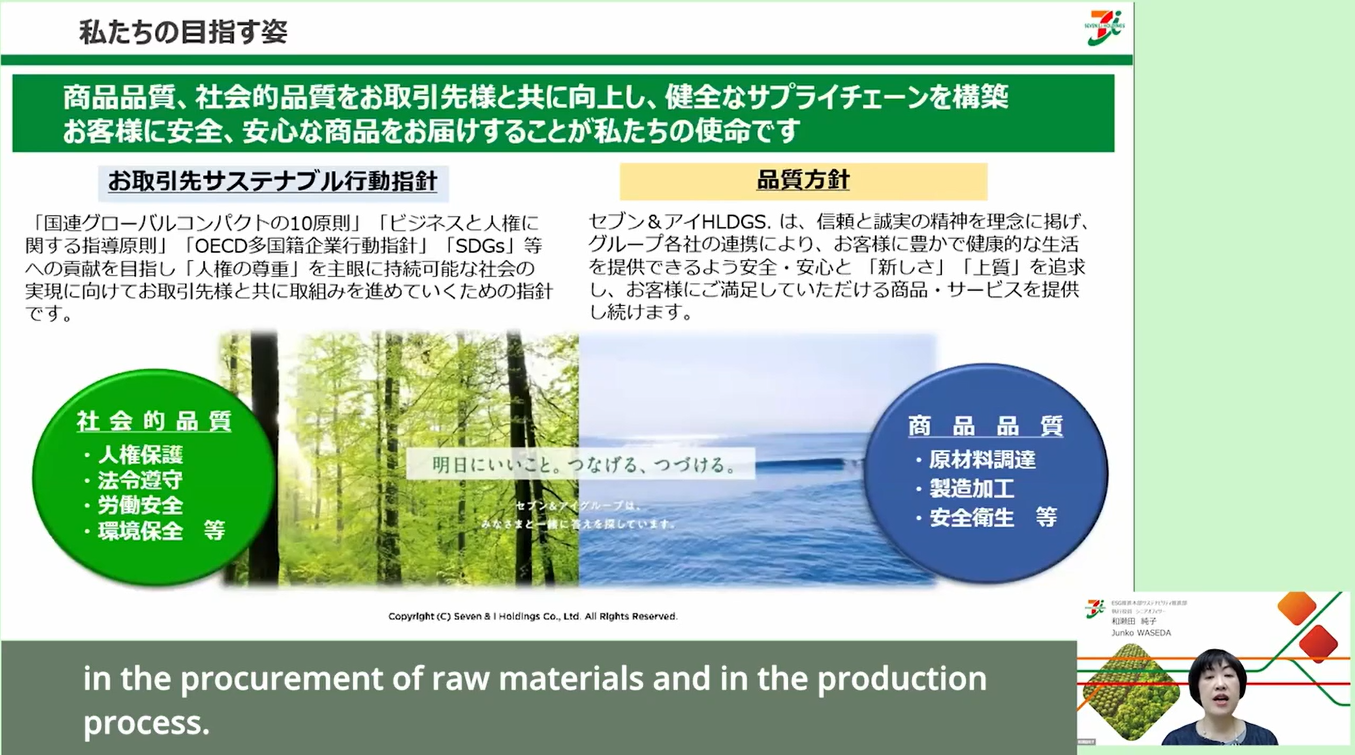
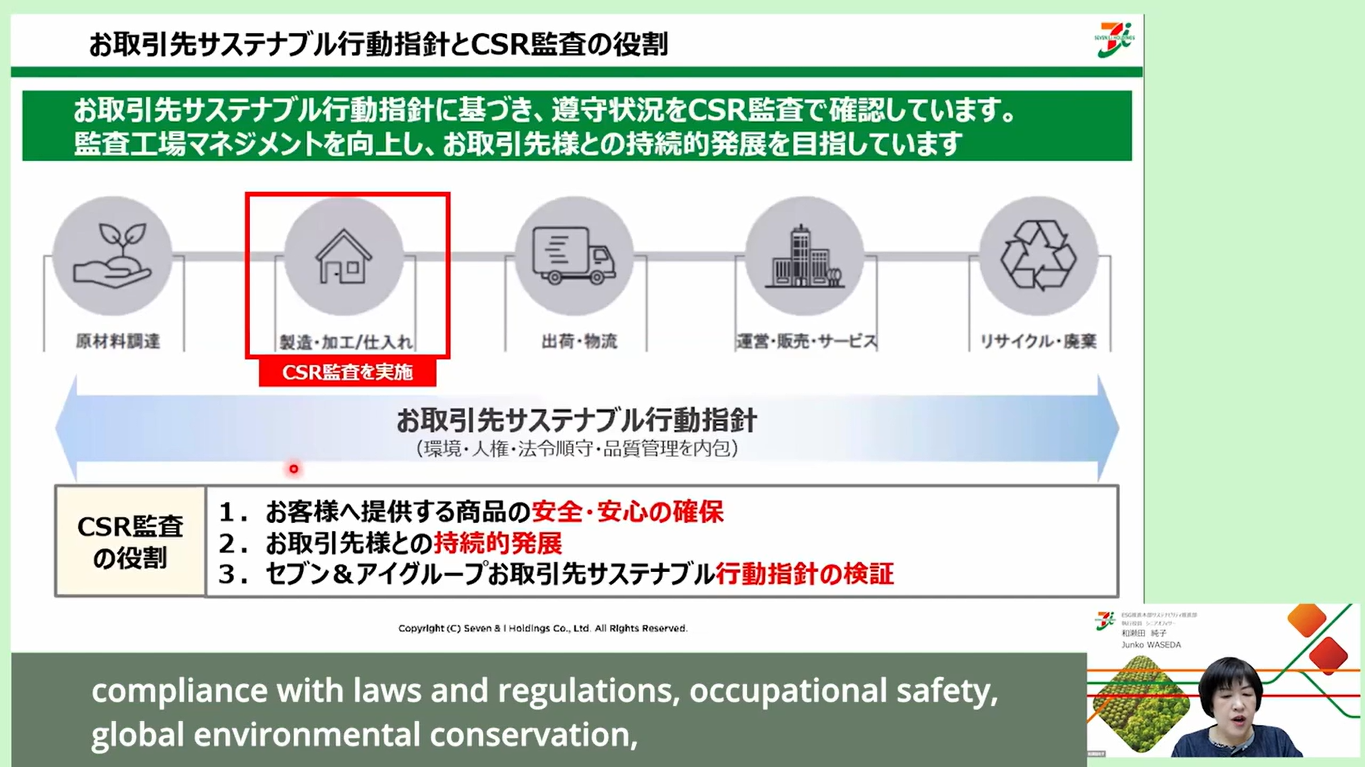
Briefing Sessions on the Seven & i Holdings Business Partner Sustainable Action Guidelines and CSR Audits
Conducting Compliance Training for Suppliers
Seven & i Holdings holds compliance training for its suppliers who manufacture private brand products on consignment with the aim of raising awareness of human rights, labor environment, and global environmental conservation, as well as promoting understanding of and thorough compliance with relevant basic laws and regulations. This training is based on the Seven & i Holdings Business Partner Sustainable Action Guidelines, CSR audit objectives, ILO International Labor Conventions, ISO 26000, occupational safety laws and regulations in each country, facility management, and chemical management. To deepen understanding of ESG benchmarks, case studies based on examples from peers and consultations on corrective actions based on CSR audit results are also offered.
Since FY2020, due to the impact of the novel coronavirus infection (COVID-19), we have held online video training via on-demand delivery. In the fiscal year ended February 28, 2025, multiple contents are available for viewing at any time, and a cumulative total of 4,700 people viewed the videos. For the management and preparation of the training, we ask TÜV Rheinland Japan Ltd., which handles CSR audits, to conduct the training.
Compliance Training for Suppliers Implementation Status by Fiscal Year
*1 FY2020 and FY2021: Online live events and recorded distribution
*2 FY2022, FY2023, and FY2024: On-demand distribution
| FY2020*1 |
FY2021*1 |
FY2022*2 |
FY2023*2 |
FY2024*2 |
|
|
Times (No. of Contents) |
5 times | 19 times | 8 contents | 8 contents | - |
| No. of Participating Companies | 604 | 517 | 480 | 416 | 396 |
|
Total No. of Participants (including Viewers) |
870 | 3,566 | 14,698 | 5,882 | 4,700 |
In-House: Compliance Training
Our Group holds meetings attended by the managers and staff of the departments in charge of product development and procurement at each Group company to report on the results of CSR audits and hold study sessions on the audits. At the study sessions, we invite the audit manager from TÜV Rheinland Japan Ltd., our CSR audit contractor, to provide explanations using specific examples about the latest information and regulations concerning the countries and regions where our manufacturing contractors' factories are located.
Compliance Training (in-House) by Fiscal Year
|
FY2020 |
FY2021 |
FY2022 |
FY2023 |
FY2024* |
|
| Times | 5 | 6 | 3 | 1 | 1 |
| No. of Participants | 418 | 2,090 | 285 | 231 | 2,281 |
*Starting FY2024, e-learning will be expanded to a wider audience.
Collaboration with Human Rights and Economy-related Organizations
Seven & i Holdings is making efforts to collect and disseminate information on supply chain management in cooperation with human rights and economic related organizations. We are a member of the Global Compact Network Japan (GCNJ) and the Council for Better Corporate Citizenship (CBCC), both of which are external organizations. We also participate as an advisory group company in the "JAPAN PLATFORM FOR MIGRANT WORKERS TOWARDS RESPONSIBLE AND INCLUSIVE SOCIETY," a joint secretariat of the Japan International Cooperation Agency (JICA) and The Global Alliance for Sustainable Supply Chains (ASSC). We aim to achieve a multicultural society by protecting the human rights of foreign workers, in our operation, as well as those in the supply chain, promoting the development of appropriate working and living environments, and realizing decent work for foreign workers. Furthermore, as part of these efforts, we are participating in the Foreign Worker Consultation and Relief Pilot Project, which was launched in May 2022 by the Japan Platform for Migrant Workers towards Responsible and Inclusive Society (JP MIRAI).
Main Activities:
・September 2019: Global Compact Network Japan
At GCNJ's Basic Seminar, we explained our Business Partner Action Guidelines and CSR audits.
・November 2019: OECD Advisory Board of Japan Business Federation and Corporate Behavior/ SDGs Committee, BIAC Japan representative
We participated in and gathered information from “Toward the Realization of a Sustainable Supply Chain in Asia: Promotion of International Cooperation for Responsible Corporate Behavior,” which was jointly sponsored by the OECD, EU, Japanese government, and ILO.
・January 2020: Public interest incorporated association Council for Better Corporate Citizenship (CBCC)
We shared information at “Round-table Conference on Issues for Promoting CSR in the Supply Chain” held by CBCC.
・October 2020: Our Director and Managing Executive Officer participated in a panel discussion on "Corporate Management from the Perspective of Life and People" at the GCNJ Symposium 2020 as a panelist.
・February 2023: Panelist at the “CSR (Corporate Social Responsibility) and Human Rights Seminar” held by the Center for the Promotion of Human Rights Education and Enlightenment, commissioned by the Small and Medium Enterprise Agency of the Ministry of Economy, Trade and Industry. Seven & i Holdings' CSR initiatives were presented.
Information Disclosure
Seven & i Holdings is committed to timely and appropriate information disclosure to all stakeholders, including customers, suppliers, and investors, in order to build a sound supply chain. By actively disclosing information on the results of CSR audits and issues in the supply chain, we are able to provide safer and more secure products to our customers.
Relief Measure/Remedies
Seven & i Holdings has established a reporting contact point (Helpline) for suppliers and stakeholders working in the supply chain. If human rights violations are found through CSR audits or reporting, remedial measures are taken after conducting an appropriate investigation.
Business Partner Helpline
The Business Partner Helpline is available to directors, employees, and former employees of our suppliers. The system is introduced at briefings for suppliers, and leaflets are distributed to promote awareness. In the fiscal year ended February 28, 2025, 85 cases were reported to the Business Partner Helpline.

